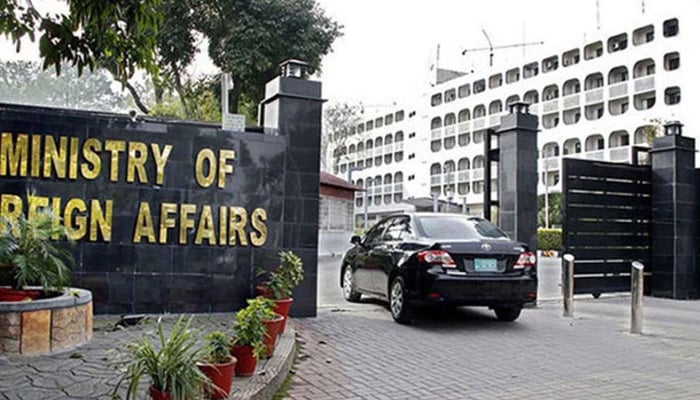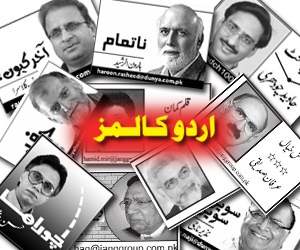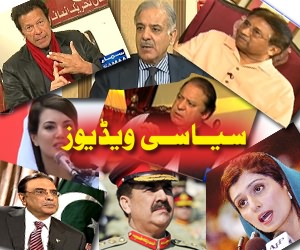The beginning of Sharif’s endgame - Read Now
Posted By: Ali on 06-11-2016 | 05:23:31Category: Political Videos, NewsA supreme court appointed commission in Pakistan will finally seal the fate of Prime Minister Nawaz Sharif who has been up against months of increasingly vocal opposition attacks, following revelations of large-scale offshore wealth belonging to his three children, unearthed in the so-called ‘Panama leaks’ scandal.
Given that the process is a judicial one, it would be foolish to predict the outcome of this affair, notwithstanding claims and counter-claims from Sharif’s supporters and the opposition led by former cricket player-turned politician Imran Khan.
But in the past week, the way Sharif’s Pakistan Muslim League — Nawaz (PML-N) has used brutal tactics to block opposition protests in Islamabad and its surrounding Punjab province, there is a central question: Whether Sharif is now conclusively locked in an inevitable endgame of his tenure. More than three years after Sharif made history in 2013, becoming the first politician ever to be elected for a third time to a five-year tenure, he is indeed up against formidable odds.
To Imran’s credit, he has kept up the pressure on demanding a full-scale inquiry on the ultimate source of the wealth belonging to Sharif’s children. Imran has pressed his case on the grounds that any conclusion that establishes a ‘paper trail’ and reveals that the money eventually came from Sharif and well beyond his known sources of wealth, must then present grounds for the prime minister to be held accountable.
On the face of it, the Pakistani prime minister and his team have done everything possible to delay the probe. Their eventual agreement to the Supreme Court-appointed commission came about only after Imran threatened to lead activists from his Pakistan Tehreek-e-Insaaf (PTI) or Pakistan Justice Movement to launch a major anti-government protest in Islamabad. And while there is indeed a Supreme Court-directed inquiry now underway, Sharif’s supporters continue to insist that the wealth of his three children had no connection with their father and therefore that should not be ground for the father to be taken to task.
A supreme court appointed commission in Pakistan will finally seal the fate of Prime Minister Nawaz Sharif who has been up against months of increasingly vocal opposition attacks, following revelations of large-scale offshore wealth belonging to his three children, unearthed in the so-called ‘Panama leaks’ scandal.
Given that the process is a judicial one, it would be foolish to predict the outcome of this affair, notwithstanding claims and counter-claims from Sharif’s supporters and the opposition led by former cricket player-turned politician Imran Khan.
But in the past week, the way Sharif’s Pakistan Muslim League — Nawaz (PML-N) has used brutal tactics to block opposition protests in Islamabad and its surrounding Punjab province, there is a central question: Whether Sharif is now conclusively locked in an inevitable endgame of his tenure. More than three years after Sharif made history in 2013, becoming the first politician ever to be elected for a third time to a five-year tenure, he is indeed up against formidable odds.
To Imran’s credit, he has kept up the pressure on demanding a full-scale inquiry on the ultimate source of the wealth belonging to Sharif’s children. Imran has pressed his case on the grounds that any conclusion that establishes a ‘paper trail’ and reveals that the money eventually came from Sharif and well beyond his known sources of wealth, must then present grounds for the prime minister to be held accountable.
On the face of it, the Pakistani prime minister and his team have done everything possible to delay the probe. Their eventual agreement to the Supreme Court-appointed commission came about only after Imran threatened to lead activists from his Pakistan Tehreek-e-Insaaf (PTI) or Pakistan Justice Movement to launch a major anti-government protest in Islamabad. And while there is indeed a Supreme Court-directed inquiry now underway, Sharif’s supporters continue to insist that the wealth of his three children had no connection with their father and therefore that should not be ground for the father to be taken to task.
The issue is simply not whether Sharif is the owner of the wealth belonging to his children. There is a larger two-pronged issue at stake.
On the one hand, it is vial to prove that no portion of the wealth belonging to Sharif’s children came from their father. On the other hand, it is also vital to prove that the wealth was not earned by the children with the use of their father’s clout as one of Pakistan’s mainstream politicians.
A conclusive end to the inquiry must also establish the ground rules for future conduct by Pakistani politicians. For long, Pakistan’s politicians have been blatantly complacent over complying with the country’s laws, especially those related to taxes. This has meant that accusations of past wrong-doings of scandalous proportions have often been ignored by successive rulers. Consequently, a major crisis of revenue collection across Pakistan has meant that key segments of the social sector for impoverished Pakistanis, such as education and health care, have been badly neglected.
However, one of the worst manifestations of wrong-doing at the top has been the malicious effect that this has had across Pakistan down to the grass roots. Today, in Pakistan, it is hard to find even a single government-run outfit — such as the police, municipality, department of education or health care — where corruption is not rampant.
In spite of frequent publicity campaigns to draw the attention of the public towards prominent politicians who either pay no tax or only chip in sharply below their dues, Pakistan’s tax collection system remains largely dysfunctional. Successive governments in Pakistan have failed to force the public to pay their taxes owing to the lack of moral authority on the part of the politicians of the ruling parties. Currently in Pakistan, the inquiry that has just been announced by the Supreme Court may not fill the gaps in tax collection immediately, but it certainly marks the first serious step towards a long overdue measure.
In tandem with the Supreme Court proceedings, Pakistan also needs to urgently embark on meeting two equally-compelling challenges.
First, the investigations into the ‘Panama leaks’ needs to be followed up by reviewing a spate of laws that have historically given cover to the elite to conveniently hide their ill-gotten gains. During Sharif’s first tenure as prime minister, which began in 1990, Pakistanis were allowed to open foreign currency accounts within the country without having to reveal the source of their wealth. While there has been some modifications to those laws over the years, the philosophy that drove those laws still remains intact. Today, many affluent Pakistanis consider it their right to ignore the country’s tax laws without the fear of ever getting caught. That mindset needs to change if Pakistan is to begin reforming itself.
Second, exemplary punishments must be handed down to those found guilty of committing economic crimes — notably tax evasion — if Pakistan is to ever begin reforming itself. The virtual absence of any example of the high and mighty being taken to task over financial irregularities has eventually meant that rampant violations are committed across Pakistan without the fear of ever getting caught. In brief, the ‘Panama leaks’-related inquiry could well become the first step towards formulating a set of much-needed progressive measures. At least that should be the hope for the future.

 Chief Minister Sindh Murad Ali Shah Speech
Chief Minister Sindh Murad Ali Shah Speech
 Military Courts Sentence Perpetrators of May 9
Military Courts Sentence Perpetrators of May 9
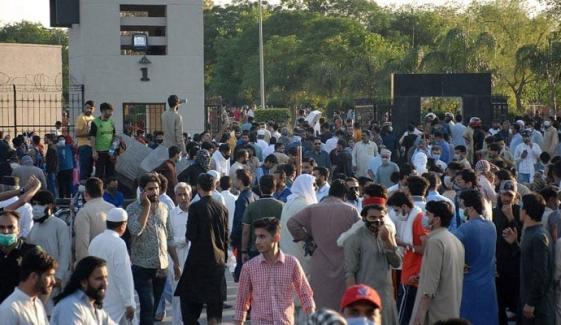 60 more criminals involved in the May 9 tragedy were sentenced
60 more criminals involved in the May 9 tragedy were sentenced
 Imran Khan Big Conspiracy Exposed
Imran Khan Big Conspiracy Exposed
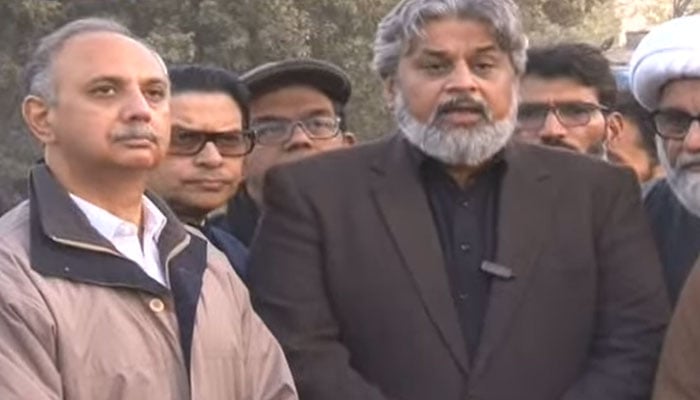 We want to bring the negotiations to a logical conclusion by January 31, Sahibzada Hamid Raza
We want to bring the negotiations to a logical conclusion by January 31, Sahibzada Hamid Raza
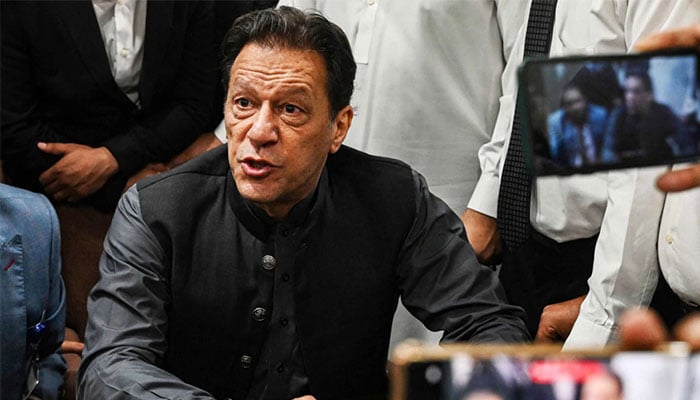 PTI founder praised the government
PTI founder praised the government
